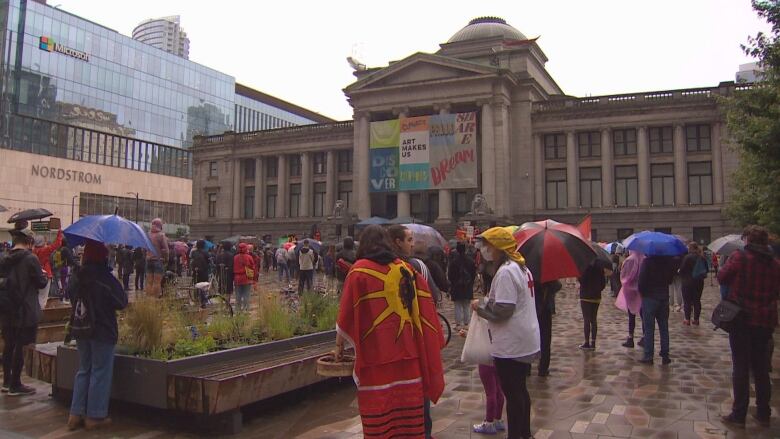Canada Day protests against systemic racism draw hundreds in Vancouver
Protesters gather at art gallery, Gassy Jack statue, Trout Lake to highlight discrimination, marginalization

As anti-racism protests shine a spotlight on systemic discrimination across the country, a demonstration in Vancouver took a more critical look at the nation's legacy of racism this Canada Day.
Following weeks of protest against police brutality and accusations of systemic racism in health care, hundreds gathered at the Vancouver Art Gallery to call out what they see as an "ongoing genocide" against Indigenous people in Canada, in an event organized by the Indigenous protest movement Idle No More.
Sierra Tasi Baker, who is Indigenous, said it is important to learn the history of Canada and particularly the history of its Indigenous people.
"It is our right as Indigenous people to be on our sovereign territory and exert our sovereignty and our title in our territories," Baker said.
"Moving forward, know whose land you're on."

Later Wednesday evening, a group of protesters formed around the Gassy Jack statue in Vancouver's Gastown neighbourhood.
Activists have been calling attention to the history of Gassy Jack, a.k.a. John Deighton, a bar owner who had operated a saloon in the neighbourhood in the 1860s. Deighton married a 12-year-old Indigenous girl, Quahail-ya, when he was 40 years old, after his first wife's death.
About 200 anti-Canada Day protesters gathered at the Gassy Jack statue in Vancouver right now <a href="https://twitter.com/cbcnewsbc?ref_src=twsrc%5Etfw">@cbcnewsbc</a> <a href="https://t.co/trw8nZ4SdR">pic.twitter.com/trw8nZ4SdR</a>
—@evacsengeActivists delivered speeches and demanded action, saying the statue represents pedophilia.
The statue was vandalized with red paint last month. More than 17,000 people have signed a petition calling for the removal of the statue, which is owned by the City of Vancouver.
In his Canada Day address, Prime Minister Justin Trudeau acknowledged there are real problems the country has to address like systemic discrimination and the continued marginalization of Indigenous peoples.
"That doesn't prevent us of from saying, 'wow, we're a great country,' but it does highlight that we need to be even better. We need to make sure everyone benefits from this country," Trudeau said.

Another event was held at Vancouver's Trout Lake, where organizers wanted to celebrate Black and Indigenous artists often ignored by the arts industry.
Tinthi Tembo, one of the organizers of the event, said the struggles of Black and Indigenous people overlap.
"We just couldn't stand anymore to commemorate a day that sensationalizes and glorifies colonialism and genocide, and especially being on this particular land here in B.C., being on stolen land, it's a force to be reckoned with," Tembo said.
Organizer Kimani Geoffrey added it's important for people to consider their own role in oppression.
"Everybody in this country is going to have to ask [themselves] what have I done … what have I done to count?" he said. "Am I going to be counted in this moment in history as somebody who did something?"
With files from Eva Uguen-Csenge